Why Name Species?
Background to the UKSpecies project.[more]
Species Names
Origins of common and scientific names.[more]
FAQ
Facts and figures about the project.[more]
Web-links
More UK biodiversity resources.

Searching for Species Information
This section provides tips and hints for using the UK Species website.
- Tips for navigating the UK Species website
- Searching for Species Information (exact matching)
- Searching for Species Information (approximate matching)
- Generic Searches

1. Tips for navigating the UK Species website
'Restarting Server' page
When the UK Species database has not been used for an hour or so, the database server enters an inactive state.
This allows it to release resources for other processes to use, increasing the efficiency of our web services.
When you start a new search session you may see the 'Restarting Server' page displayed in response to your first search:

|
The server will return to a fully functional state in a short time (<1 minute), and will remain active for the rest of your session.
Species Summary page
In general, locating information for a particular species should require no more than two levels of navigation. If the initial search matches more than one species, a listing page is displayed which provides links to information for the individual species:
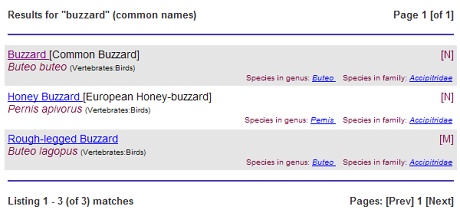
Where more than 10 species are listed, successive pages are navigated using numbered links provided near the bottom right-hand side of the page.

Returning to the Search page
If you are searching for information about a number of unrelated species, click on the 'UK Species' icon (at the top left-hand side of the page) between searches to return to the start page:
If you are looking for related species, a number of quick links are provided on the Species Information and listing pages (see below).

2. Searching for Species Information (exact matching)
Searching the UK Species database by common or scientific (latin) name is very straightforward. Simply enter the search string, for example "Blackbird" or "Turdus merula" (without quotes), and select the appropriate search type.
Common name search:
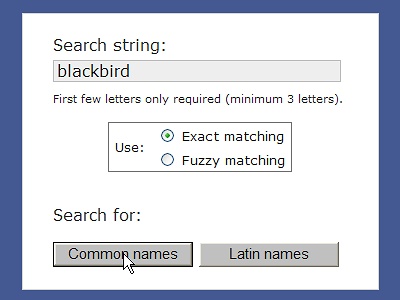
Latin name search:
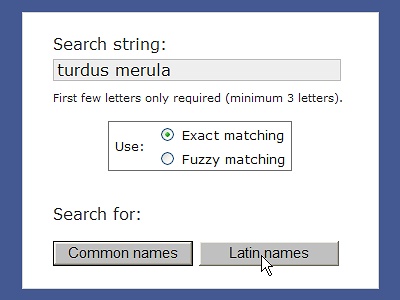
Searches are not case-sensitive.
Spaces, hyphens or other differences in punctuation are ignored during the search, for example;
|
Dog's Mercury Dogs Mercury Dogs-mercury |
Saint John's wort St. John's wort St John's wort St. Johns-wort St Johnswort |
are treated as 'Dogs Mercury' and 'St Johns wort' respectively.
By avoiding slight differences in the ways names are written, the UK Species search engine is able to simplify common name searches and generate more reliable results.

3. Searching for Species Information (approximate matching)
If you are unsure of the exact spelling of a species name, two strategies are available to lookup species information:
Sub-string searches
Enter the first few letters (three or more) of the name followed by an asterisk, and use the 'Exact matching' option:
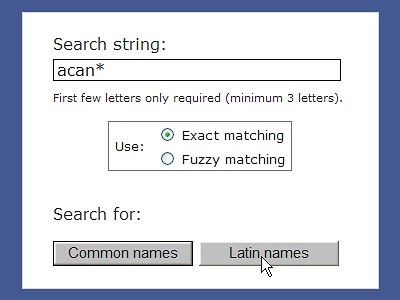
Sub-string searches will match all names beginning with the relevant letters.
Fuzzy searches
Enter the full name (to the best of your knowledge) and use the 'Fuzzy matching' option:
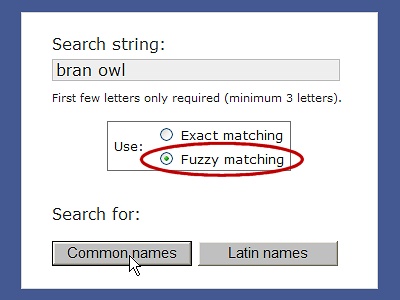
Fuzzy searches allow for character insertions, deletions and transpositions, as well as differences in punctuation, hyphenation and concatenation.
This search method is particularly useful for scientific (latin) names, which can be surprisingly easy to misspell.
As fuzzy searches apply less stringent matching criteria, they may take slightly longer than exact searches due to the additional processing required.
Both methods may be used with common or latin names.

4. Generic Searches
It is possible to search for species within a genus (or for similar common names) simply by searching for the appropriate name:
eg.
| Group | Search method |
|---|---|
| Species in the genus 'Carex' | Latin name search for 'carex' |
| Species of 'eyebright' | Common name search for 'eyebright' |
However a more precise search for related species is provided with the information for any particular species:
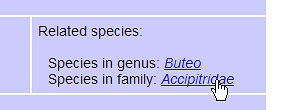

If you have any difficulties using the UK Species database, or comments or suggestions about the product, please email us at: .
